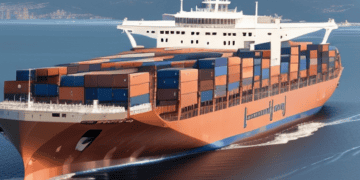Amid rising security concerns in the Suez Canal region, German container shipping leader Hapag-Lloyd, along with Japan’s maritime giants Mitsui OSK Lines and Nippon Yusen, have made strategic decisions to reroute their vessels as a precautionary measure. This development was confirmed by a Hapag-Lloyd spokesperson on Friday, who also mentioned that the situation would be re-evaluated on January 2nd.
The decision comes in response to recent threats from Yemen’s Houthi militant group, which has targeted ships in the Red Sea, prompting these companies to avoid the Suez Canal and Red Sea routes. As an alternative, vessels are being directed around Africa via the Cape of Good Hope. This detour not only increases the journey time for shipments from Asia to Europe and the east coast of North America by several days or even weeks but also imposes additional costs on customers due to the increased distance and fuel consumption.
The industry’s response to these security challenges has been mixed, with some companies adjusting their operational strategies. Danish shipping giant Maersk, for example, intends to continue using the Suez Canal for the majority of its Asia-Europe container traffic, diverting only a select few vessels around Africa. This information was gleaned from a recent Reuters analysis of Maersk’s shipping schedule. In a similar vein, France’s CMA CGM has announced plans to increase its use of the Suez Canal route, signaling confidence in the passage despite recent tensions.
The repercussions of these rerouting decisions have been felt in the stock market, with shares of both Hapag-Lloyd and Maersk experiencing uplifts of 1.1% and 1.8% respectively on Friday. This trend reflects investor optimism that the need for longer maritime routes could potentially drive up freight rates in the short term.
In the wake of these security threats, some shipping lines, including CMA CGM, have introduced surcharges to mitigate the financial impact of diverting vessels, further escalating the costs associated with sea transport. This strategy is a direct consequence of the Houthis’ aggressive actions, which included an attack on the Mediterranean Shipping Co’s container ship United VIII during its transit through the Red Sea, highlighting the ongoing risks in the region.
The Suez Canal is a vital artery for global trade, facilitating the passage of about one-third of the world’s container ship cargo. The decision to bypass this critical waterway and navigate around the southern tip of Africa can lead to an additional fuel cost of up to US$1 million for each round trip between Asia and Northern Europe. This substantial financial burden underscores the significant impact that geopolitical tensions can have on international shipping routes, operational decisions, and the broader landscape of global trade.
As the situation continues to evolve, the maritime industry remains vigilant, balancing the need for security with the imperative to maintain efficient global supply chains. The decisions by Hapag-Lloyd, Mitsui OSK Lines, and Nippon Yusen to reroute their vessels reflect a broader industry trend towards adapting operational strategies in response to geopolitical risks, with implications for shipping costs, delivery times, and the overall stability of international trade flows.
Catch the latest supply chain news at The Supply Chain Report. Learn more about international trade at ADAMftd.com with free tools.
#MaritimeSecurityConcerns #SuezCanalRerouting #GlobalShippingNews #HapagLloyd #MitsuiOSKLines #NipponYusen #MaerskShipping #CMACGM #CapeOfGoodHopeRoute #RedSeaRisks #GlobalTradeRoutes #FreightRateImpact #GeopoliticalShipping #ShippingCostIncrease

















